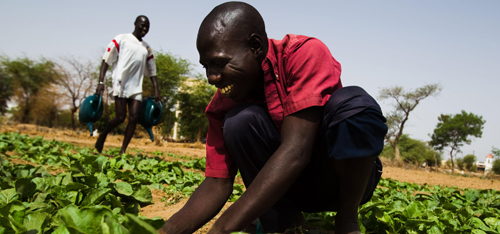Benin
Some 80 percent of Benin's 10.3 million people earn a living from agriculture. Most are subsistence farmers, growing crops on small family plots. But poor infrastructure and flooding, which can wipe out harvests and seed stocks, are just some of the challenges Benin farmers face.
Domestic rice production falls short of demand, forcing Benin to rely on imports to make up the difference. Farmers, however, are using just a fraction of the country's available land that could be adapted for growing rice. To counter this, the Government has made scaling up rice production a priority.
Cotton is Benin’s most important cash crop, contributing approximately 35 percent to the country's export revenues and providing an income to roughly three million people. However, cotton productivity and profitability have declined in recent years due, in part, to poor management practices - challenges that need to be addressed by the country's decision-makers.
IPPM programme in Benin
The IPPM programme, active since 2007, is in line with national policies and priorities on agricultural development, food security and poverty reduction.
The programme's main objective is to help farmers sustainably boost and diversify crop production, both for household consumption and sale. To this end, IPPM is raising awareness among farmers of the high risks associated with many commonly used pesticides and encouraging the adoption of good practices to reduce pest incidence and increase the use of relatively non-toxic biopesticides.
Through farmer field schools (FFS), the programme is also helping farmers to adopt improved agronomic practices, such as balanced fertilization and optimal plant spacing, to boost cotton, rice and vegetable production. Such practices can also help farmers cut down on the amount of expensive inputs used, such as seed and fertilizers. The overall outcome sought is higher productivity and profit with less risk to human and environmental health.
Thanks to the programme, farmers have begun to diversify their farm systems. Many FFS farmers, for example, are now growing a combination of cotton, maize and soybean. Such diversified systems can help simultaneously improve farmers’ economic and nutritional well-being, while improving soil fertility and overall ecological resilience.
The programme has trained a total of 9 590 farmers through its FFS. Based on its success, other national agriculture programmes and projects are now adopting an FFS approach.
IPPM projects in Benin
- All ACP Agricultural Commodities Programme, including cotton (regional)
- Integrated Production and Protection Management in West Africa (regional)
- POPs reduction in Niger and Senegal Rivers (regional)
Partners
IPPM is working with various partners to achieve their goals in Benin, including: Association des Interprofessionnels du Coton; Ministère de l'Agriculture, de l’Élevage et de la Pêche; Organisation Béninoise pour la Promotion de l'Agriculture Biologique; Procoton/SNV Netherlands Development Organization; and Projet d'appui à la filière coton-textile.
The IPPM programme in Benin is grateful for the continued support from its resource partners, including: European Union; Global Environment Facility; and Government of the Netherlands.

